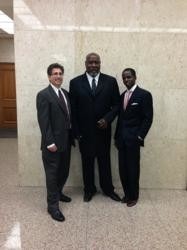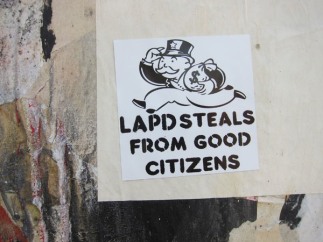$1.6 Million - Jury Finds LAPD Liable for Violating Civil Rights of Unarmed Disabled Black Man - Police Pretend Incident did not happen
/From [HERE] In Harris v. City of Los Angeles et al., CASE NO. BC 45188, a Los Angeles Superior Court jury found that a Los Angeles Police Department officer violated the civil and constitutional rights of Allen Harris, a disabled man who suffered a stroke in June of 2009, resulting in semi-paralysis of his left side. LAPD Officer Alex Tellez was found liable based on evidence that while serving a search warrant based on the mistaken belief that Mr. Harris’ son was involved in a robbery, he forced Mr. Harris semi-paralyzed arm behind his back despite Mr. Harris and his sons explaining that he had a stroke and his arm could not go behind his back.
 Nonetheless, the evidence at trial showed Officer Tellez forced the injured arm behind Mr. Harris back, clamped the handcuff on his left wrist so tight as to cause nerve damage, slammed him into a wall and refused to loosen the handcuff on his left wrist, despite Mr. Harris plea of pain. Mr. Harris suffered a reopening of a clavicle fracture he suffered in September of 2009 when he was mugged and permanent nerve damage in his wrist.
Nonetheless, the evidence at trial showed Officer Tellez forced the injured arm behind Mr. Harris back, clamped the handcuff on his left wrist so tight as to cause nerve damage, slammed him into a wall and refused to loosen the handcuff on his left wrist, despite Mr. Harris plea of pain. Mr. Harris suffered a reopening of a clavicle fracture he suffered in September of 2009 when he was mugged and permanent nerve damage in his wrist.
The Los Angeles Superior Court jury awarded $1,596,000 in compensatory damages to the Plaintiff for medical bills, physical pain, and mental and emotional harm.
The jury’s verdict restored my client's faith in the justice system after 10 LAPD officers testified in court that this incident essentially never happened. If the LAPD could badly injure a stroke survivor with a semi-paralyzed arm, who is next? The truth prevailed in Court despite the LAPD’s cover up. ” Stated Attorney V. James DeSimone.
One juror said in an interview after the verdict that the case was particularly troubling to her and others on the panel because of what she described as the unforthcoming testimony of Tellez and the nine other officers who took the stand during the trial. All of the officers testified that they did not know who had handcuffed Harris, according to both juror Gayle Chavkin and Harris' attorney. The officers also claimed under oath that Harris, a stroke victim who walks with a pronounced limp, showed no signs of being disabled during the encounter, the attorney and juror said.
"It was the same testimony over and over and over: 'I don't recall. I don't recall,'" Chavkin said. "They were clearly just closing ranks....It felt untruthful to us. Somebody matching Officer Tellez's description handcuffed Mr. Harris that day and hurt him."
If the officers had been more candid, the jury may have come down less harshly and ordered the city to pay less money to Harris, Chavkin said. "It was completely unbelievable to us that out of 10 officers, no one remembered anything," she said.
The testimony given in the trial of the case was, as follows: On November 10, 2009, LAPD Officers were serving a valid search warrant at plaintiff’s residence and when serving this warrant, Officer Alex Tellez handcuffed Mr. Harris to detain him while executing the search warrant. At trial, Officer Tellez denied ever handcuffing Mr. Harris. Mr. Harris testified during the trial that he was about to take a shower so he did not have his leg brace on which assisted him when he walked, when he heard a loud banging at the front door. He further testified that as he exited his bedroom, he was confronted with an officer pointing a shotgun at him yelling commands to “put your hands behind your back turn around and walk backwards towards my voice.” Mr. Harris promptly raised his right hand and explaining that, “I can’t put my hand behind my back, I had a stroke, and I can’t walk backwards.” Mr. Harris testified that as the commands were repeated, Mr. Harris’ two sons who were also present at the apartment also yelled to the officers, “He can’t put his hands behind his back, he’s disabled, and he had a stroke.” Instead of accommodating him, Mr. Harris testified that he was aggressively dragged out of his apartment and Officer Tellez grabbed his injured left arm, twisting his wrist, and forcing his spasming semi-paralyzed left arm behind his back. A neighbor who testified at trial observed that while this was occurring, Mr. Harris was imploring “I can’t put my hand behind my back, you’re hurting me.” The evidence at trial demonstrated that Officer Tellez ignored all the information given and after forcing Mr. Harris’ arm behind his back, slammed him against a stucco wall and single cuffed him clamping the cuffs down in an improper and excessively tight manner. Mr. Harris complained that the cuffs were too tight and hurting him. Finally about 10 minutes later, another set of cuffs were put on Mr. Harris, however, the left cuff, which was cutting into his wrist, was never loosened. After the handcuffs were removed. Mr. Harris continued to complain about the pain and swelling of his wrist, but his complaints were ignored. Medical doctors testified at trial that the handcuffing of Mr. Harris caused him to suffer nerve damage. Mr. Harris testified that he suffered burning pain in his clavicle which did not heal for six months, as well as wrist pain and a loss of movement in his wrist resulting from the nerve damage caused by the handcuffs. [MORE]
The jury also found the officer battered Mr. Harris, and that he acted with malice and oppression for his harmful conduct. The jury verdict on the civil rights claim provides for an award of attorney’s fees under the California Civil Code Section 52.1.
Tellez did not respond to a request for comment. In a prepared statement, LAPD Chief Charlie Beck he was "disappointed by the verdict and the monetary award" and supported plans by the city attorney's office to appeal.
Not understanding Democracy and how the jury system here in America works, in his statement, ignorant Beck questioned the legitimacy of Harris' claims, saying that Harris never mentioned being hurt to the officers and that he waited four days before he sought treatment. Harris and DeSimone rebutted both claims, saying Harris complained about his wrist that morning and that medical records show he sought treatment two days later.
In ordering Tellez to pay the $90,000 in punitive damages, Chavkin said jurors felt "we needed to send a message that this is not right — don't ever do this again. We felt there needed to be a consequence for him disregarding Mr. Harris' pleas."
It's unclear whether Tellez will have to pay the money. City officials can choose to indemnify him.































































































































































































































































































